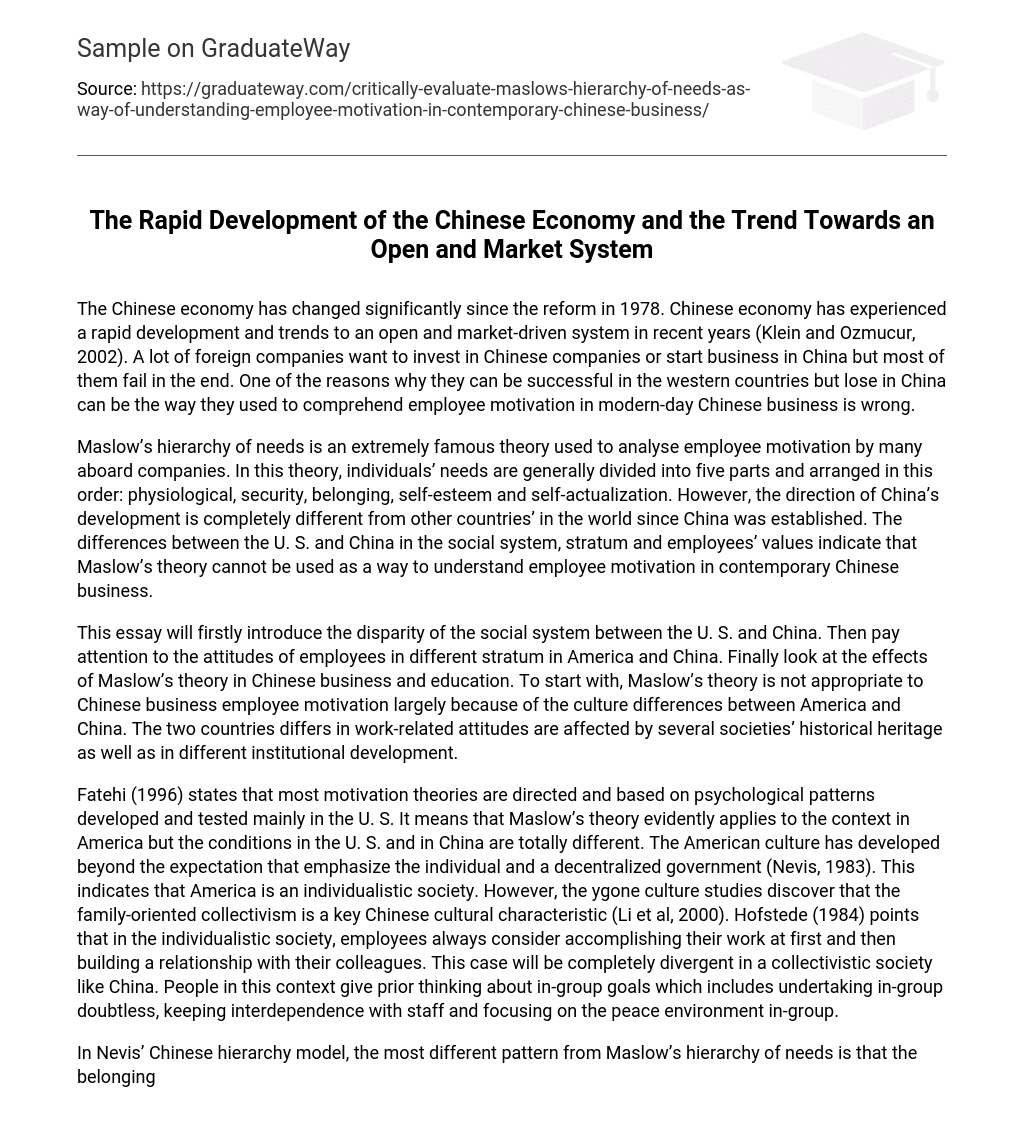The Chinese economy has undergone substantial changes since the reform in 1978. It has witnessed rapid development and transition towards an open and market-driven system (Klein and Ozmucur, 2002). Many foreign companies aspire to invest in Chinese companies or establish businesses in China, but a significant majority end up failing. One potential explanation for their failures in China, despite successes in Western countries, could lie in their incorrect understanding of employee motivation in contemporary Chinese business practices.
Maslow’s hierarchy of needs is a well-known theory utilized by numerous international companies to assess employee motivation. The theory categorizes an individual’s needs into five segments and organizes them in the following sequence: physiological, security, belonging, self-esteem, and self-actualization. Nevertheless, China has followed a distinct trajectory in its development compared to other nations since its inception. The disparities in social system, stratum, and employees’ values between the United States and China imply that Maslow’s theory is inadequate for comprehending employee motivation in contemporary Chinese businesses.
This essay will discuss the social system disparity between the U.S. and China, as well as the attitudes of employees in different strata in both countries. Additionally, it will examine the impact of Maslow’s theory on employee motivation in Chinese business and education. Cultural differences between America and China make Maslow’s theory less suitable for employee motivation in Chinese businesses due to varying work-related attitudes influenced by historical heritage and institutional development.
According to Fatehi (1996), motivation theories primarily developed and tested in the U.S. are mostly focused on psychological patterns. While Maslow’s theory applies well in the American context, it may not be applicable in China due to significant cultural differences. The U.S. culture emphasizes individualism and has a decentralized government (Nevis, 1983), whereas Chinese culture values collectivism and family orientation (Li et al, 2000). Hofstede (1984) explains that in individualistic societies like the U.S., employees prioritize their work before building relationships with colleagues. However, this is different in collectivistic societies like China, where people focus on in-group goals, interdependence with staff, and maintaining a harmonious environment within the group.
According to Nevis (1983), the Chinese hierarchy model differs from Maslow’s hierarchy of needs in that belonging is considered the most fundamental issue for Chinese employees. This highlights a key difference in understanding employee motivation in Chinese culture compared to Maslow’s theory. Another factor indicating the inadequacy of Maslow’s theory for understanding Chinese employee motivation is that attitudes and work expectations can vary across different social strata and countries. Presently, Chinese managers are confronted with the task of prioritizing organizational efficiency (Wang, 2007).
The attitudes of employees have a significant impact on their behavior in organizational jobs. Some researchers have discovered links between institutional development, attitudes, and values. A comparative study conducted in 15 countries reveals contrasting levels of job satisfaction and commitment to the enterprise between established capitalist countries and former socialist countries (Alas and Rees, 2006). The findings in former socialist countries suggest that the way individuals shape their attitudes could vary based on institutional developments during their career progression (Alas and Vadi, 2006).
Although they receive higher payment, most employees still feel unsatisfied. This contradicts the belief that high wages are the most effective motivator for employees. While employees in the lowest stratum, such as building workers and cleaners, are motivated by basic needs such as physiological and security, those in the middle or high stratums do not have these concerns. Thus, Maslow’s theory does not encompass all possible aspects of needs.
Company that employs Maslow’s hierarchy of needs must take into account that the shape and content of the need hierarchy will vary greatly depending on different conditions. Even though Maslow’s theory may not perfectly align with Chinese company management, it still has some positive impact on Chinese business and manager training in the company. For instance, by carefully considering employees’ condition, position, and desired work organization, compensation, and management style, Maslow’s hierarchy of needs can still be used as a means to identify and implement methods to motivate employees.
Executives can meet employees’ physiological needs by providing adequate salaries to cover their basic necessities. Job security, retirement benefits, and a safe working environment can fulfill employees’ safety needs. Additionally, fostering a team atmosphere helps employees feel included. Maslow’s hierarchy of needs can also be applied to address consumers’ specific needs by guiding companies in product development, sales, and marketing.
One example of utilizing Maslow’s theory in business strategy is seen in the garment industry. Manufacturers can cater to the diverse needs of different income groups. Lower-income individuals prioritize basic needs, such as protection from the environment, while higher-income individuals seek self-actualization through luxurious and costly clothing. By understanding and addressing these needs, manufacturers can create appealing products and tap into new markets (Maslow’s Hierarchy of Needs & Business Strategy, 2003).
Using Maslow’s theory to understand employee motivation in modern Chinese businesses is not appropriate because it was developed during a time when American culture emphasized individual achievement. Maslow’s hierarchy primarily focuses on personal growth and career opportunities within US society. However, it’s important to note that China is a collectivistic society while the United States is individualistic. These cultural differences significantly impact the attitudes and motivations of Chinese business employees.
Furthermore, Maslow’s hierarchy of needs is outdated. To comprehend the motivation of employees in modern Chinese businesses, companies ought to adopt a tool that is founded on research relevant to present-day Chinese society. Additionally, the scope and depth of these studies are crucial. Employers should also recognize that money is not the primary aspiration for employees; providing a favorable working environment and giving importance to their needs and desires are more impactful than monetary compensation alone.





